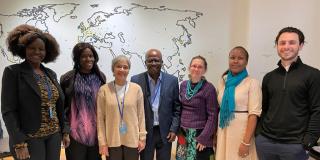
Ezekiel Esipisu has been working as the Global Head of Programme Development for the past nine years, ensuring VSO's programmes are people-centred, inclusive, resilient, and accountable to deliver impact. Here's his VSO journey.
What brought you to the development sector?
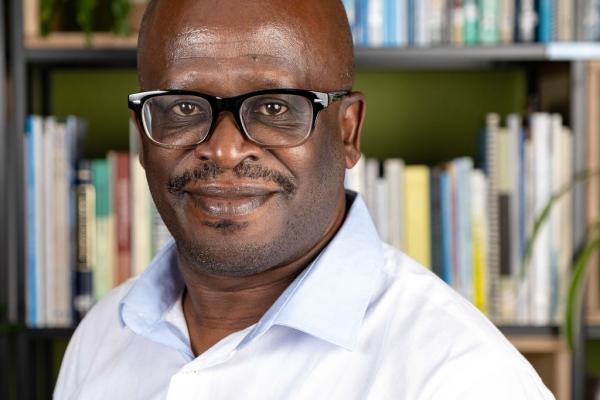
"Growing up in rural Kenya, I saw and experienced first-hand the difficulties and marginalisation that so many people face. When I finished my postgraduate studies, I had the option to pursue a career in academia as a Junior Research fellow at the Institute of African Studies (UoN), but it didn’t inspire me.
Instead, I felt that working with organisations to help dismantle structural barriers that entrench and perpetuate the kind of inequality I’ve seen and experienced felt like the right thing to do.
To this day, being able to contribute to transforming the lives of the most vulnerable and marginalised communities continues to motivate and inspire me.
I've been with VSO since 2015, serving as the Global Head of Programme Development. Before joining, I had worked with various development organisations, such as K-Rep, Plan International, ECLOF, and Habitat for Humanity International, empowering and building the agency of those that were vulnerable, marginalised and generally at the bottom of the pyramid.
What's your role at VSO?
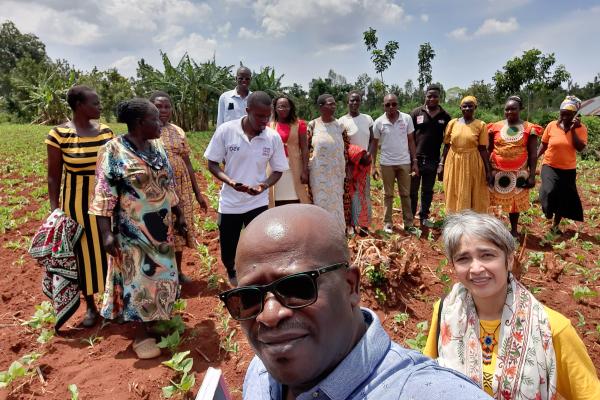
My job is to assure the quality of VSO’s programmes and ensure that they are people-centred, inclusive, resilient, and accountable to deliver impact.
My main priority is promoting VSO's development practice - Volunteering for Development (V4D) - throughout the organisation, making sure it’s at the core of everything we do, and that our programmes are addressing those underlying structural and systemic barriers to development.
I work on developing robust systems and practices, making sure our programmes are always high-quality, evidence-led, and based in the volunteering for development principles.
What do you think makes VSO different?
We intentionally identify and target poverty and exclusion at the source, by focusing on resilience, social accountability, social inclusion, and gender. By addressing these underlying issues, we tackle the root causes, not just the effects, of poverty and marginalisation.
We measure the impact of our programmes by conducting independent evaluations for each project. We then combine the results with data from surveys and case studies collected through our global data platform and use the information to create quarterly and annual reports that synthesise a wide range of evidence.
A key part of all this is the Measuring Impact for Learning and Empowerment (MILE) approach – it's participatory, primary actor-led and a cornerstone of how we can ensure ongoing impact.
(Primary actors are the marginalised people in communities that we work with, whose needs we respond to in our programming.)
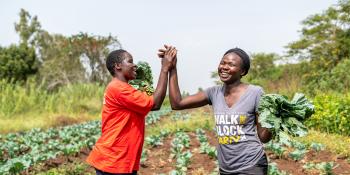
Volunteering for development
Our unique volunteering for development approach puts the most marginalised people first.
It’s crucial that we build trust with the people at the heart of development. We bring together a diverse blend of volunteers to work together, and place communities at the centre of their own development journey.
The approach empowers individuals to create change, and fosters new connections and cooperation among people, organisations, and systems. Voluntary action becomes a powerful force within communities themselves, driving progress and inspiring transformative change for the better.
What makes the Volunteering for Development (V4D) approach so sustainable is that it provides a deeper understanding of systems and communities, incorporates diverse perspectives, and increases skills and knowledge for everyone involved.
This leads to new insights and innovation, and improved confidence and capabilities for individuals, communities, and governments to drive change, while embedding the ownership of a community’s development within the community itself. We work with and through local partners that are aligned to our mission.
Part of our mandate is to build their capacity to ensure they can continue to operate long after VSO has left.
How has the conversation about professional and skills-based volunteering evolved in recent years?
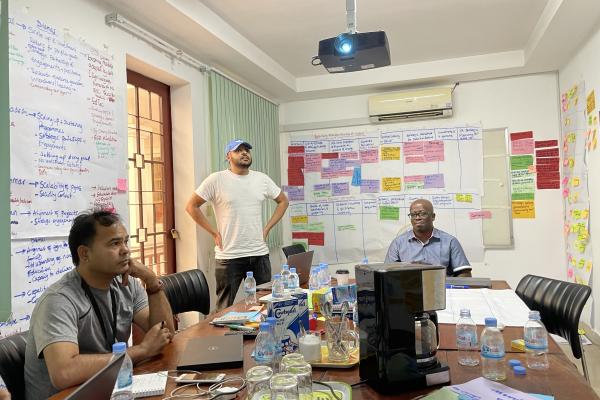
Once we made the shift from being “volunteer sending” to a “volunteering for development” organisation, it signalled our commitment to integrating volunteers more deeply into the design and delivery of our programmes.
VSO takes its accountability to primary actors earnestly and seeks to build and centre their voice and participation. We use a structural analytical framework of poverty, inequality, and vulnerability to design project interventions.
Our work through the seminal research projects have shown that when different types of volunteers work together within the same project, they have a complementary and multiplying effect for sustainable development results.
When a project is designed with primary actors’ voices and participation, through the lens of our inclusion, accountability and inclusion, and delivered by a blended volunteering team, it’s a tangible demonstration of the value of VSO’s volunteering for development approach.
What does your average day look like?
My typical day starts with dropping my daughter off at school early in the morning around 6.45 am. From there, I head to my home office and begin by checking my emails, which often arrive overnight due to different time zones. Most of my day is usually taken up by meetings and reviewing reports and documents that need my action.
Every part of the day has unique moments; you can never know what to expect. I’m always inspired when I go into meetings and listen to our project teams talking through some of their interventions, and how it’s changing the lives of the primary actors in the communities.
Working from home has its benefits, but there are certain aspects I miss from office life. I miss the small “catch-up talk” as we brewed tea in the kitchen. I miss seeing my colleagues more often and just unwinding over lunchtime as we munched on our food on the office balcony. I miss picking up what was happening in other parts of the organisation by listening to what my colleagues were discussing. I miss the work camaraderie.
I do take small breaks during my workday (which isn’t always easy!). More importantly, I try to connect and reconnect with my colleagues within the Gauteng region (South Africa) at least once every few months.
Outside of work, spending time with my family brings me great joy, especially with the intensity of my work and travel. I’m also a sports lover – whether it’s going to live games or on TV.
What do you like most about your role?
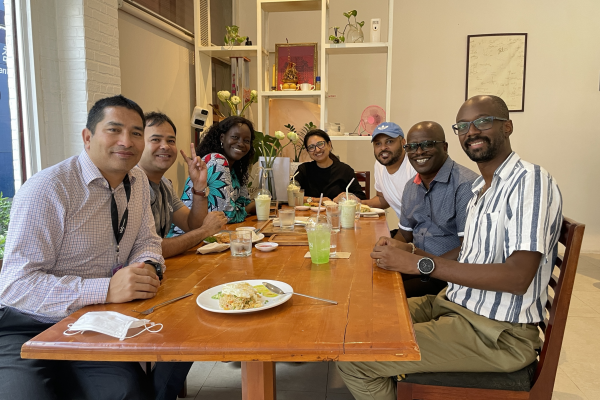
The most rewarding aspect of my role is collaborating with others, including communities, to design interventions that bring lasting positive impact and change to the communities we partner with. I also love that I’m able to connect with almost all parts of the organisation.
VSO’s people-first principles have had a significant impact on me, both personally and professionally. Now, I’m always thinking about how people can be more meaningfully engaged in working through solutions to whatever challenges they face – and how we can be accountable to these same communities is always at the front of my mind.
What advice would you give anyone considering a career in the development sector?
Take time to understand the local communities you'll be working with and supporting and their contexts. Listen to the community's different voices and diverse aspirations and learn from their local knowledge and coping mechanisms.
Understanding the context and the dynamics therein is vital in helping determine the kind of response you need to design. The local people should be at the centre of these processes and interventions. Always ensure that these processes are truly inclusive."
Life at VSO
Here at VSO, we have a team that operates across the world. Our Life at VSO blog series gives you an insight into what life is like working for a world leading international development through volunteering organisation.
Read more

Transforming lives through education: Geoffrey’s VSO legacy
With a deep belief in the transformative power of education, Geoffrey from Norfolk, UK, has devoted his life both in the UK and abroad to making education more accessible for all.
